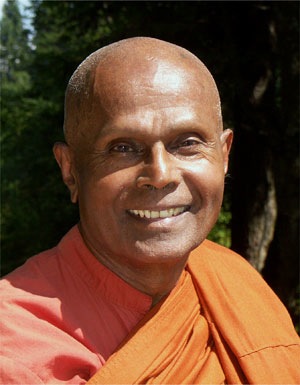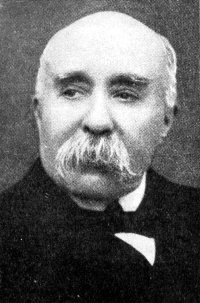Opportunities to Grow

“View all problems as challenges.
Look upon negativities that arise as opportunities to learn and to grow.
Don’t run from them, condemn yourself, or bury your burden in saintly silence.
You have a problem? Great.
More grist for the mill. Rejoice, dive in, and investigate.”
–Henepola Gunaratana (a.k.a. Bhante Gunaratana, a.k.a. Bhante G., Sri Lankan Buddhist Monk, 1927-)
Excedding Your Potential

“A man’s life is interesting primarily when he has failed—I well know. For it’s a sign that he tried to surpass himself.”
–Georges Clemenceau (French Politician, and, from 1906-1909 and 1917-1920, Prime Minister of France, 1841-1929)
Wishing You Great Learning Opportunities in the New Year!

“The world is the great gymnasium where we come to make ourself strong.”
–Swami Vivekananda (Indian Hindu Mystic and Spiritual Teacher, 1863-1902)
A lot of people tell me that they are pleased to see the back of 2006, and we certainly had more than our fair share of challenges during the year, having lost four members of our family in just a few months. The fact that they were not all human didn’t change the impact one bit.
But for all the people who have told me about their negative thoughts about the year I’ve said the same thing: the year has actually been a terrific learning experience. That’s not to say that we should slap a big smiley face on every pain, hardship and adversity, but it does mean that it is essential for all of us to try and find the meaning in the events that have happened in our lives.
When Nietzsche said “That which does not kill me makes me stronger,” he was giving voice to a peculiarly Germanic ideal of the time: that people need to be tested and tempered like steel. That’s not what I mean at all.
The three best and most effective ways of dealing with adversity are first to extract meaning from the event or situation: “Why is this happening?” “Is it just dumb bad luck or is there more to it?”
The second essential is to learn to detach from an event, so that it no longer has its emotional claws in you.
And the third is to accept a situation. Not in some passive way of letting life bowl you over, but of being able to acknowledge an experience and then using it as the basis for wise action.
Each of these can take a lifetime to learn the hard way, but you can actually master them very quickly with a series of simple steps.
I am going to be sharing some of them with you in the coming months. I am also going to be publishing an eBook on the topic of resilience, because detachment and acceptance come much more easily to the person with robust resilience.
Having recently had to make a number of unexpected trips overseas has delayed our publication schedule by three months, but we shall be back on track by the end of January.
And here’s a final thought for you from Healing, Meaning and Purpose: adversity is an invitation to grow. If approached in the right way, apparently negative events can lead to a shift in your consciousness and rapid spiritual development.
In fact the majority of my own teachers could trace their spiritual maturation to major life events that at the time seemed to be the end of the world.
Remember that what the caterpillar thinks to be the end of the world, is, for the butterfly, just a new beginning!
“Trials, temptations, disappointments — all these are helps instead of hindrances, if one uses them rightly. They not only test the fiber of character but strengthen it. Every conquering temptation represents a new fund of moral energy. Every trial endured and weathered in the right spirit makes a soul nobler and stronger than it was before.”
James Buckham (American Naturalist and Writer)
“The most spiritual human beings, assuming they are the most courageous, also experience by far the most painful tragedies: but it is precisely for this reason that they honor life, because it brings against them its most formidable weapons.”
–Friedrich Wilhelm Nietzsche (German Philosopher, 1844-1900)
“Out of confusion, you invent something permanent – the Absolute, the Brahman or God.”
–Jiddu Krishnamurti (Indian Spiritual Teacher, 1895-1986)
Chess and the Mind
I have a confession to make: I have been a life long chess enthusiast, and I can’t start the day without visiting the best chess website on the internet. We are currently almost half way through the second major tournament of the year: the same one at which the incomparable Garry Kasparov announced his retirement last year.
Chess is not just a pastime. There is evidence that it is one of the ways in which we can improve the thinking abilities of young people and prevent the downward slide of our minds as we get older.
In the United Kingdom, studies have shown an astonishing correlation between the academic attainments of schools and the success of their chess teams. Year after year, the schools with the most successful teams send more of their students to top universities, compared with schools that do not play the game or have weak teams. During the Second World War many of the geniuses working at Bletchley Park who cracked the Enigma Code, were outstanding chess players.
For a long time now big business has been recruiting high-level chess players into particular positions that require their unusual skills. It tells you something when you see a major corporation placing advertisements for executives in chess magazines. Chess helps develop memory, concentration, visualization, decision-making, and sharpens our analytical and strategic thinking. It can even help make us more creative and more imaginative. Tournament players have to have a good degree of self-knowledge, and some grasp of psychology is a must. I have won more than one tournament game because of my ability to read the body language and intentions of an opponent. It is no surprise that a good many strong chess players are doing extremely well playing online poker. Chess really is a microcosm of life in general.
“Life is like a game of chess: we draw up a plan; this plan, however, is conditional on what – in chess, our opponent – in life, our fate – will choose to do.” –Arthur Schopenhauer (German Philosopher, 1788-1860)
The chess master Bruce Pandolfini was portrayed – and had a brief cameo – in the film Searching for Bobby Fischer. He has written a nice little book called Every Move Must Have a Purpose, about applying chess strategies in business and life, and next month will see the eagerly awaited publication of a similar book by the master himself, Garry Kasparov.
Here are some principles that I have learned from chess, and that I apply to health, life and business:
- When confronted with any kind of a problem, try to break it down into small manageable chunks, and if you can’t, learn to use and to trust your intuition. (Have a look at my post on Unconscious Processing and Intuition)
- Constantly ask questions: Why is this happening? Is there a pattern here? What does the other person intend? How can I fashion a response that fits and will move things in the direction that I want and is congruent with my overall plan of life? What are the rules here? Can I break the rules? This does not mean cheating, it means being sure that you are not applying rules mechanically, without checking to make sure that they apply in your particular situation.
- Always work to a clear plan. Even if the plan is not correct, it will always be better than the efforts of someone who has no plan at all. It is fine to “go with the flow,” after you have won the game!
- Be constantly on the lookout for opportunities and if there aren’t any, create them!
- As in life, chess demands action. You will succeed at nothing by sitting and waiting for success to come to you.
-
A game of chess, like the game of life demands one move after another. The successful person is one who makes each move to the very best of their ability. As Willard J. Marriott said: “It’s the little things that make the big things possible. Only close attention to the fine details of any operation makes the operation first class.”
-
Have absolute integrity in everything that you do. Be honest with other people and be honest with yourself. If you say that you are going to do something, do it. If you commit to a plan, do not stop until it is complete.
- Coordinate all of your resources. In chess, it is impossible to win unless all the pieces are coordinated. You can destroy everything that you’ve worked for by having a piece adrift on the far side of the board, with nothing to do.
- If you have any weakness, make it your business to convert them into strengths.
- Don’t exceed your own capacity by over-extending yourself.
- Resilience is an extremely important attribute that we all need to develop: things do not always go according to plan, and when they do not, it is important to be able to bounce back quickly.
- Learn not to be over-awed by challenges. Many people defeat themselves with faulty expectations. I once had a trainer who was an extremely fine player. In one tournament he was in with a chance of winning serious money, but in the last round he was drawn against a Russian grandmaster. I saw him before the game: shoulders hunched over, hyperventilating and a scowl on his face. Play began with a variation that my coach and I had analyzed five days earlier, and he had shown me what not to play. In the game against the Russian he played the very move that he had just told me was a critical mistake! He lost in just a few moves. Not because the Russian beat him, but because he beat himself.
“A mountain is composed of tiny grains of earth. The ocean is made up of tiny drops of water. Even so, life is but an endless series of little details, actions, speeches, and thoughts. And the consequences whether good or bad of even the least of them are far-reaching.” — Sri Swami Sivananda (Indian Physician and Spiritual Teacher, 1887-1963)
Technorati tags: chess, life lessons, mind






